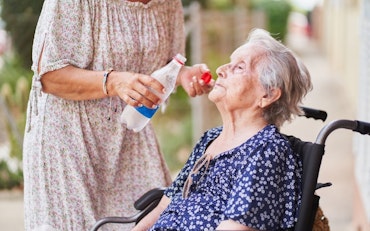1 in 7 older Australians felt mental health worsen during pandemic
Australia’s peak organisation for older Australians, Council on the Ageing (COTA) Australia, has released new research showing that the COVID-19 pandemic has led to worsening mental health among the elderly.

(Source: Shutterstock)
Australia’s peak organisation for older Australians, Council on the Ageing (COTA) Australia, has released new research showing that the COVID-19 pandemic has led to worsening mental health among the elderly.
The COTA report, ‘Mental health and wellbeing during the COVID-19 Pandemic: The lived experience of Australians aged 75 and over,’ found that of the 1000 Australians over the age of 75 who were surveyed, 1 in 7 reported that their mental health had worsened during the pandemic.
Currently, 1 in 5 Australians will experience mental ill-health every year and half the nation will be diagnosed with a mental illness during their lifetime.
“The mental health needs of older Australians are so often forgotten about,” said COTA Australia Chief Executive Patricia Sparrow.
The research report is in line with the Government progress report on the National Mental Health and Suicide Prevention Plan (2017 – 2022), which detailed a greater need for funding to support older people with mental health struggles.
“Throughout the pandemic we heard a lot about the mental health needs of other age groups, but too often we seem to forget that older Australians need our support too,“ Ms Sparrow said.
“This research shows that older Australians were doing it [sic] incredibly tough throughout the pandemic and without adequate data and targeted strategies to help them, there’s no way of knowing if that’s getting any better or worse.“
14 percent of respondents said that their mental health had worsened during the pandemic and 15 percent said that their mental health had fluctuated.
Loneliness and distress arising from lockdowns, along with the inability to freely interact with friends and family were key impacts highlighted by the research study.
Additionally, respondents saying that their mental health had not been impacted still reported feelings of sadness, worrying and experiencing a loss of appetite.
20 percent of respondents claiming that their mental health had suffered during the pandemic said that they had no one to talk to during lockdowns mandated to control the virus.
A further 8 percent of respondents said that they couldn’t receive support for their worsening mental health when they needed it.
The report revealed that of the surveyed participants, older women were more likely to report that their mental health had been impacted or had fluctuated during the pandemic, relative to their male counterparts.
“We know how crucial and effective proactive, early intervention strategies can be when we’re looking at mental health, but there are very few proactive [sic] put in place to support older Australians and that needs to change,“ Ms Sparrow added.
“We need to ensure that the strategies older people asked for — support for strong social connections, the right information, access to social support and services, age-informed mental health expertise — are in place and funded as part of the sixth National Mental Health Plan.“
In 2021, the former Government pledged $2.4 million dollars for increased and improved mental health training in aged care workers and supporting collaboration with the Mental Health Professionals’ Network.
“All Australians, no matter what their age, should have the right to an adequate standard of healthcare, and this includes mental health care and services,” said Ms Sparrow.
For more information about mental health services available to you, please visit our service provider directory for support or call 1300 404 547 to find a provider in your area.










